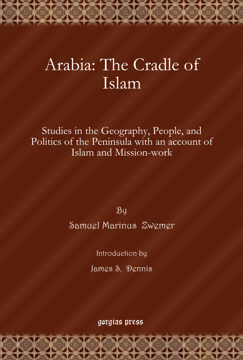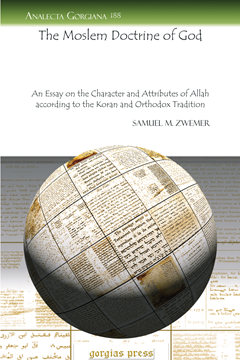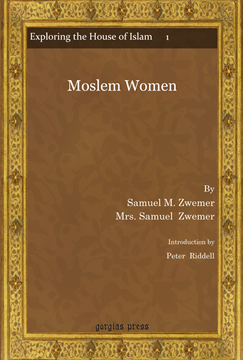Samuel M. Zwemer
The Cradle of Islam
Studies in the Geography, People, and Politics of the Peninsula with an account of Islam and Mission-work
By Samuel Marinus Zwemer; Introduction by James S. Dennis
ISBN: 978-1-61719-638-6
This book describes the Arabian peninsula on the eve of the First World War.
$226.00 (USD)
Islam and its Need
By W. Norman Leak; Preface by Samuel Marinus Zwemer
Series: Analecta Gorgiana 704
ISBN: 978-1-61719-823-6
Leak provides a survey of Islam, and its relations to Christendom. His work involves the history, distribution, doctrines, and practice of Islam, and argues that the utter unlikeness of Allah is equivalent to agnosticism.
$40.00 (USD)
The Moslem Doctrine of God
An Essay on the Character and Attributes of Allah according to the Koran and Orthodox Tradition
Series: Analecta Gorgiana 188
ISBN: 978-1-60724-284-0
In his zeal to convert Muslims to Christianity, Zwemer was unmatched and this book helps to explain why. Not shy about admitting that the three major monotheistic religions share the concept of one God, he begins an examination of Islamic ideas about God, from a Christian perspective. Starting with the premise of the singularity of Allah, Zwemer discusses the Muslim ideas of the divine essence. In a chapter about the ninety-nine names of Allah he explores the similarity to the rosary and Islamic ideas of divine justice. Passing next to the attributes of Allah, Zwemer examines and analyzes what Muslims assert regarding God. In further chapters he deals with how Allah interacts with the world, the concept of the Trinity, and predestination. Determining that the completed idea of God in Islam is incomplete, Zwemer concludes with a case for the God of Christianity.
$59.00 (USD)
Moslem Women
Series: Exploring the House of Islam: Perceptions of Islam in the Period of Western Ascendancy 1800-1945 1
ISBN: 978-1-60724-409-7
Moslem Women is built around six main chapters; half are devoted to the place and experiences of Moslem women, and half consider the Christian mission to these women. The Zwemers acknowledge some of the great women of Islamic history, such as Rabia, the famous early mystic, and Nurah Mahal, wife of the Mughal Emperor Jahangir. They speak in glowing terms about advances in the women’s situation in post-Ottoman Turkey. Their work is dedicated to serving Muslims and to seeing them as people rather than as faceless numbers; it is an excellent model for today’s Christians who feel called to engagement with Islam.
$189.00 (USD)
Moslem Women
Series: Exploring the House of Islam: Perceptions of Islam in the Period of Western Ascendancy 1800-1945 1
ISBN: 978-1-60724-409-7
Moslem Women is built around six main chapters; half are devoted to the place and experiences of Moslem women, and half consider the Christian mission to these women. The Zwemers acknowledge some of the great women of Islamic history, such as Rabia, the famous early mystic, and Nurah Mahal, wife of the Mughal Emperor Jahangir. They speak in glowing terms about advances in the women’s situation in post-Ottoman Turkey. Their work is dedicated to serving Muslims and to seeing them as people rather than as faceless numbers; it is an excellent model for today’s Christians who feel called to engagement with Islam.
$189.00 (USD)




